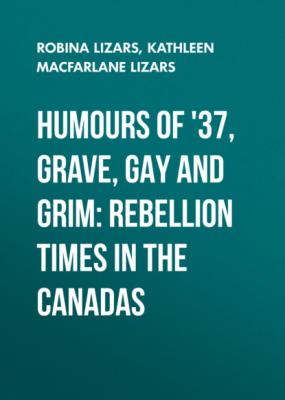Humours of '37, Grave, Gay and Grim: Rebellion Times in the Canadas. Robina Lizars
Читать онлайн.| Название | Humours of '37, Grave, Gay and Grim: Rebellion Times in the Canadas |
|---|---|
| Автор произведения | Robina Lizars |
| Жанр | Документальная литература |
| Серия | |
| Издательство | Документальная литература |
| Год выпуска | 0 |
| isbn | 4064066215569 |
Robina Lizars, Kathleen Macfarlane Lizars
Humours of '37, Grave, Gay and Grim: Rebellion Times in the Canadas
Published by Good Press, 2019
EAN 4064066215569
Table of Contents
NEW WORDS TO AN OLD SONG; OR, JOHN GILPIN TRAVESTIED.
A Call to Umbrellas. “ We must have bloody noses, and cracked crowns, and pass them current, too. ”
Autocrats All. “ It is in me and shall out. ”
Canadian Historical Literature. (PUBLISHED IN 1896-97.)
WILLIAM BRIGGS, Richmond St. West, Toronto. Montreal: C. W. COATES. Halifax: S. F. HUESTIS.
PREFACE.
The title of this book is built upon the assumption that humour is a sense of incongruity, not that there was anything specially humorous in the affairs of ’37 beyond that which arose from the crudeness of the times.
A medium between the sacrifice of detail attendant on compilation, and the loss of effect in a whole picture through too close application of the historic microscope, has been attempted. True proportion is difficult to compass at short range, yet the motives, ideas and occurrences which produced the animosities leading to the Rebellion were the inheritance, the special property, of the men who lived then; and of them few remain. To those who do and who have so kindly given their reminiscences special thanks are due. The works of the documentary and the philosophic historian lie on the shelves ready to one’s hand; but those who were “Loyalist” and “Rebel” are quickly dropping into that silence where suffering and injustice, defeat and victory, meet in common oblivion.
Like lichens on rocks, myths have grown about that time; but the myth is worth preserving for the sake of the germ of truth which gave it birth. Historians sometimes tell the truth, not always the whole truth, certainly never anything but the truth, and nothing is to be despised which gives a peep at the life as it really was. For complexion of the times, the local colour of its action, there can be nothing like the tale of the veteran, of the white-haired, dim-eyed survivor, whose quaking voice tells out the story of that eventful day. A page from Pepys or Bellasys lifts a curtain upon what really took place when the historic essence fails; then some morsels of secret history come to light, and motives and actions hitherto puzzling stand revealed.
Were all contributed sentences herein to have their rights in inverted commas the publisher’s stock would be exhausted. The prejudice in favour of Italics has not been observed in certain cases. “A bas les prejudices;” in Canada French is not a foreign language.
It is also assumed that every Canadian is familiar with Canadian history, and that some one or other of its masters is well fixed in school memories. To those masters, and to many others, an apology is tendered for wholesale appropriation of their matter. If every statement made herein were substantiated by the customary foot-note many unsightly pages would be the result; therefore, as no statement has been made without due authority, we commend our readers to the writings of Parkman, Garneau, Dent, McMullen, McCarthy, Macaulay, Michelet, DeGaspé, LeMoine, David, Morgan, Carrier, Bonnycastle, F. B. Head, George Head, Macgregor, Bender, Lindsay, Rattray, Scadding, Thompson and others; to the writings and biographies of the statesmen and governors quoted; to Governmental Journals and House of Commons Debates; for the record of events as they daily took place to innumerable manuscripts, pamphlets and newspapers, written or published between Sarnia and Quebec and in many American cities, covering in particular the years ’36, ’37, ’38, ’39, ’40; and to various sources where Canada is treated as a side issue and not as a main point. Theller and McLeod have been used where the corroborative testimony of others warrants a transcription of their humours.
“Whether an eagle or ant in the intellectual world seems to me not to matter much,” says Joubert. The work of the humble ant is to gather fragments, and, as the humblest in the tribe, the collectors of the data from which this mélange has risen offer it to the public, and as humbly hope they have come within the same writer’s further observation: “A small talent, if it keeps within its limits and rightly fulfils its task, may reach the goal just as well as a great one.”
Stratford, October, 1897.
Several score of authorities, known or comparatively unknown, have been drawn on in the compilation of Gallows Hill. Bill Johnston and Colonel Prince, as they appear here, are derived from twenty-one and twenty-six authorities respectively. Therefore when the hundredth, and the twenty-second, and the twenty-seventh, shall arise to contradict, or disagree with, each and every word herein, the authors beg to be allowed to see nothing but a humour in the situation.
NEW WORDS TO AN OLD SONG;
OR, JOHN GILPIN TRAVESTIED.
